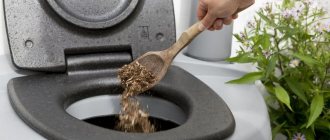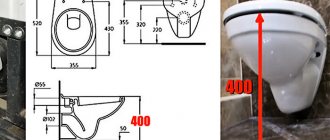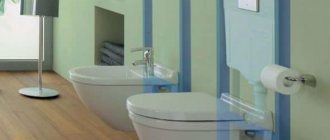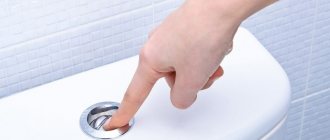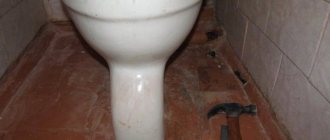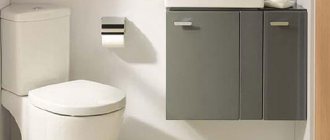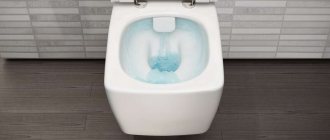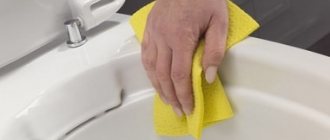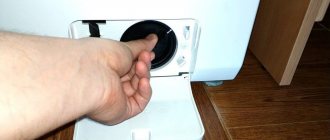Some plumbing fixtures begin to work worse after prolonged use. A common problem with toilets is loose fixation. Because of this, it is inconvenient to use a wobbly device. You can secure the toilet so that it does not wobble with your own hands if you have some skills in handling tools. There are several ways to do this.
Features of plumbing installation
Plumbing fixtures are installed based on the installation instructions supplied with them. During construction or major renovations, this work is performed by professional plumbers. Later, after moving in, many residents independently make their own adjustments to the bathroom design and change the appliance to another one.
To perform such work efficiently, it is important to know what methods of securing the device to the flooring exist and how to perform them correctly. Installation features are directly related to the configuration of the plumbing. Typically, domestic bathrooms use compact floor-mounted models. The mounting of such plumbing fixtures varies.
Reasons for a loose toilet
Before fixing the device to the flooring surface, it is important to determine the reason for the loosening of the plumbing fixtures. There are usually several of them, but they come down to three main ones:
- uneven floor coverings;
- plumbing installed with errors;
- defects and irregularities on the bottom surface of the bowl.
Bathroom floors are usually covered with a concrete base, but there are also wood options. Due to the loss of tightness of the fastening screws during operation, a toilet mounted on a wooden surface begins to wobble. Sometimes cracks form where the screws are attached to the boards. This is what most often causes loss of stability.
Sometimes the surface of the concrete screed is poured in violation. This leads to deformation and differences in floor height. This also makes the toilet “walk”. In some cases, the cause of unreliable fastening is non-compliance with the toilet installation technology.
Right choice
You can find silicone sealants on sale in different packages: cartridges, tubes, sprays. The cheapest ones are the usual formulations in tubes that have an elongated spout. Cartridge sealants require the additional purchase of a special gun. They are usually purchased for processing large areas.
Silicone sealant must not only be used correctly, but also purchased with a serious approach to the issue. To begin with, you should choose a composition that matches the color, although most often craftsmen prefer transparent or white products. There are also several other factors to consider.
Best before date
Sometimes sealants with expiring shelf life are sold at a large discount. You should not be fooled by tempting offers: usually the products are thicker, less elastic and may partially lose other beneficial properties, especially fungicidal ones.
Undamaged packaging
If there is even a small crack on the body of the product, it will quickly dry out from contact with air. When purchasing, you need to make sure that the integrity of the tube or other packaging is completely preserved. After uncorking, you need to cover all areas that require this in literally 3-4 days, otherwise the sealant will begin to dry.
Firm
Reliable, proven brands produce high quality products. The best proven sealants are Titan, Knauf, and Soudal. The downside is their higher price, because a well-known brand always has a slightly inflated price for the product.
Place of purchase
Sealants are sold everywhere, even in supermarkets. You should not buy them second-hand on the market; for this there are specialized departments or construction and hardware stores, where the goods are probably not expired.
Fastening plumbing fixtures to a wooden floor
If the bathroom floor is made of wooden planks, the loose plumbing fixture is not fixed back in its original location. It is correct to move the device slightly to the side and screw it in a new place. In this case, it is recommended to drill holes for reliable fixation, the location of which coincides with the mounting holes and secure with screws.
There is no need to try to tighten loose screws in the same place if the floor is made of planks. This will lead to cracking of the device itself. To make installation easier, it is better to make the supply line to the sewerage system from the toilet flexible.
Securing the toilet to a concrete floor
It is much more difficult to fix the problem if the flooring has a concrete base. In old buildings from the USSR, the devices were installed on concrete floors with embedded boards. In this case, to improve fastening, perform the following steps:
- Shut off the water supply to the toilet.
- Dismantle the drain tank.
- Disconnect the sewer drain pipe.
- Remove the bolts securing the plumbing fixtures to the floor.
Important! Further work is carried out carefully so as not to damage the fragile material of the old toilet.
To eliminate the damage, the old backing board is removed and new lumber of considerable thickness is laid in its place. You can simply clear this place and concrete it.
After the concrete has hardened, plumbing installation is carried out in the following order:
- Having placed the toilet in the desired area, mark the points where it will be attached.
- The plumbing fixtures are removed and holes are made in the marked area using a hammer drill.
- The device is secured with bolts.
- Reinstall the drain tank.
- The plumbing is connected to the sewer pipes using a corrugated line.
Installation on ceramic tiles
In modern apartments, the floor in the bathroom is usually made of tiles. Then the plumbing has a backlash when the tiles are not level and have differences. This type of defect is the most difficult to eliminate. After all, in order to get rid of the wobbling of the plumbing fixture, you must first eliminate the unevenness of the floor. It is impossible to do this without dismantling the tiles.
Therefore, to begin with, the problem is eliminated by placing a plastic gasket under the base of the plumbing fixture. Such devices are sold in hardware stores and are quite inexpensive. If this option does not bring the desired result and the instability continues, dismantle the tiles and lay the covering again.
Important! Silicone sealant is sometimes used as a gasket. They coat the area of the tiled floor where the device should be located. When the material is completely dry, install it. This method helps to temporarily solve the problem of a wobbly device.
Types of sealants
Depending on the composition and properties, all sealants can be divided into several groups, although there are also combined pastes and gels.
Acrylic
Typically, such products are marked with the presence or absence of water resistance. If the adhesive sealant does not have the ability to withstand moisture, it can only be used in dry rooms. Waterproof acrylic sealants can withstand high air humidity, but, as a rule, do not tolerate constant direct contact with water. The advantages of the compositions include safety for health, excellent adhesion, and a wide selection of colors. It is recommended to use them only for repairing doors, furniture, windows, and not to use them in the bathroom.
Silicone
These are the best sealants for toilets, tiles, bathtubs, sinks, and kitchen surfaces; they are in greatest demand among craftsmen. Silicone pastes have the highest resistance to humidity and temperature changes; they can be used for external and internal work.
Polyurethane
They are elastic adhesive compounds containing polyurethane, which is characterized by strength, durability, and wear resistance (many types of liquid nails are made from it). Such compositions are suitable for installing and strengthening the toilet cistern, sealing it at the base. But the products have a big disadvantage - toxicity, so they are more often recommended for outdoor use.
Bituminous
Such sealants are mainly used for outdoor work. They are perfect for installing and repairing roofing materials, fastening tiles, sealing brickwork, foundations, gutters, ventilation, chimneys. Bitumen sealants do not react to ultraviolet radiation, they fill even large voids, but they also contain solvents and are therefore toxic.
How to attach a toilet to the floor
To do the job efficiently, the master will need the following tools:
- hammer drill for construction work with several drills of various sizes;
- a hand drill along with a set of drills of different diameters for ceramic tiles;
- sandpaper with different grain sizes;
- rubber spatulas of different sizes;
- mechanical hand press;
- screwdrivers, bench wrenches and other tools.
Additionally you will need the following materials:
- plastic dowels of different diameters;
- metal screws or screws;
- several spacers for screws;
- construction adhesive;
- cement and sand;
- rubber sheet 15 mm thick;
- boards 25 mm thick.
Standard toilet fastening involves drilling holes in the floor for dowels. Then make 4 holes. If the device is mounted with screws, then only 2 holes need to be made. Difficulties are caused by drilling openings when the floor is covered with ceramic tiles. Due to awkward movement or incorrect selection of tools, the tiles easily crack.
Important! It is necessary to drill ceramics with a drill designed for this purpose, setting the rotation speed of the device to low. During operation, the pressure on the tool should be light.
When fixing the device to cement mortar, it is important to properly prepare the working mixture so that the connection is of high quality. To do this, take 1 part of M200 cement and add 2 parts of sand.
Securing the toilet with screws
To secure the toilet to the toilet floor in the standard way with screws, perform the following steps sequentially:
- The exact position of the sole is determined on the toilet floor.
- Marks are placed in the center of the holes.
- Using a special tile drill, make recesses the size of which corresponds to the thickness of the tile.
- Then they take a concrete drill and bring the excavations to a depth of 70 mm.
- Insert dowels into the resulting recesses.
- The toilet is placed in the required place so as to align the mounting holes of the plumbing with similar ones in the floor.
- Connect the device to the sewer with a corrugated pipe.
- Secure the plumbing fixtures to the floor with screws from the installation kit.
Having completed this work, you need to additionally ensure the tightness of the connection of the corrugated pipe with the sewer inlet and the toilet pipe. To do this, use any sealant. Then, if there is one, the gap between the toilet sole and the floor is cosmetically sealed.
Advantages of Sanitary Silicone Sealant
A big advantage of silicone-based sealant is the ease of working with it and the ability to install plumbing fixtures yourself. The product is universal, suitable for a wide range of actions in the bathroom, kitchen, sauna, bathhouse, swimming pool.
Other advantages of sealants are:
- resistance to UV radiation, no fading in light,
- suitability for all types of materials that go into the manufacture of plumbing fixtures: cast iron, earthenware, ceramics, acrylic,
- resistance to the influence of low, high temperatures, temperature changes, humidity, good tolerance to direct contact with water,
- the presence of a fungicide in the composition, protection of surfaces from fungus, mold,
- high strength, high adhesion force to the base,
- smooth, shiny surface of the seam after drying, aesthetic appearance,
- elasticity, the ability to stretch and shrink along with the base material,
- resistance to household chemicals and other aggressive substances that may get on the seam,
- safety for humans, environmental friendliness.
Useful tips
Plumbing materials, despite their strength, are very fragile. Therefore, maximum force should not be used when securing with screws or bolts. To reduce pressure, softening pads must be placed under the screw heads.
Important! When using glue, you need to thoroughly degrease the surface. If epoxy resin is used for fastening, the proportions of solvent and base substance are strictly observed. The surface is covered with adhesive evenly, without the formation of bubbles.
Instead of wood, you can use high-quality multi-layer plywood as “taffeta”. It is important to ensure high-quality waterproofing so that the lining does not collapse prematurely.
Recommendations for using silicone sealant
In order for the completed seam to serve for a long time, it is important to follow a number of rules when working with sealant:
- maximum joint width – 5-30 mm,
- seam thickness – up to 1 cm,
- possible application depth – up to 60 mm,
- For defects that are too deep, it is worth additionally using plumbing tape.
Following the sequence of actions and advice from professionals will help you do the job efficiently with your own hands without the involvement of specialists and extra costs.

